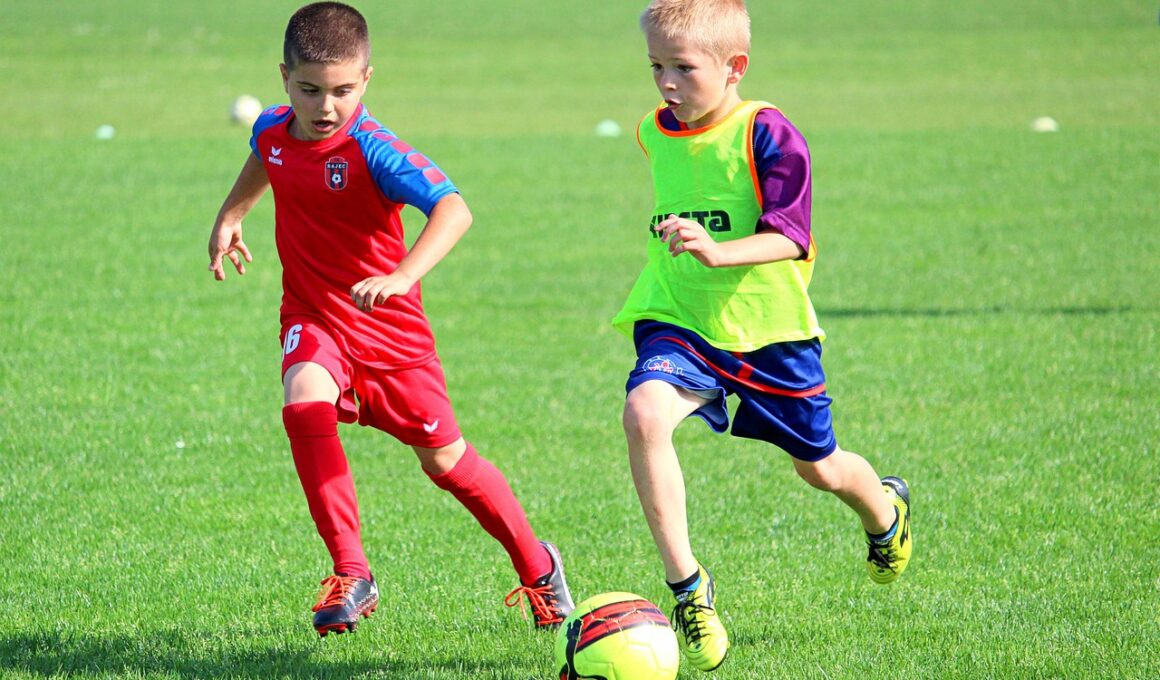The Effects of Competitive Sports on Stress Levels in Children
Competitive sports can significantly influence stress levels in children. Engaging in sports provides various benefits, including physical fitness, social skills, and mental resilience. However, being part of a competitive sport can also introduce various stressors that children must navigate. Performance pressure, the need for constant improvement, and the desire for recognition can lead to increased anxiety. Furthermore, children may experience stress from balancing their academic responsibilities with sports commitments. It is essential to emphasize the importance of creating a supportive environment for young athletes. Coaches and parents should encourage joy in the game rather than strictly focusing on winning. Healthy communication is vital; children should feel comfortable discussing any stress they experience. Physical activities can be an excellent way to cope with stress, promoting mental health through endorphin release. It is crucial to ensure that sports do not unintentionally contribute to stress rather than alleviate it. Encouraging breaks and ensuring adequate rest can help maintain a balanced perspective in children participating in sports. Learning to manage their emotions effectively equips children to handle competitive environments in a healthy manner.
Children involved in competitive sports face unique challenges, such as balancing their training schedule alongside academic responsibilities. Parents play a fundamental role in monitoring their child’s well-being and recognizing potential signs of stress. It is paramount to have an open dialogue about emotions, allowing children to voice their feelings without fear of judgment. Coaches should foster a positive atmosphere that emphasizes growth, teamwork, and personal achievements. In establishing a supportive network, children will likely respond positively to constructive criticism rather than feeling overwhelmed by it. Additionally, integrating stress management techniques can further aid children in handling competitive pressures effectively. Teaching relaxation practices, such as deep breathing techniques or mindfulness activities, can reduce anxiety levels significantly. Parents might also encourage participation in multiple sports so that children experience a variety of environments. This diversity not only prevents burnout but also helps in discovering what truly excites them. Meanwhile, setting realistic goals is crucial, as it helps children maintain motivation while avoiding feelings of inadequacy. Ensuring that children engage in their sport primarily for enjoyment is essential to their long-term involvement in physical activities.
The Role of Coaches in Supporting Young Athletes
Coaches play a critical role in shaping children’s experiences in competitive sports. A coach’s attitude and approach can either alleviate or exacerbate stress in young athletes. Coaches need to foster a nurturing environment, focusing on skills development rather than purely on winning. This can be achieved by implementing training sessions that encourage participation and enjoyment rather than mere performance metrics. Moreover, providing individualized feedback allows athletes to understand their strengths and areas for improvement in a constructive manner. Incorporating team-building exercises can enhance camaraderie and help reduce the feeling of isolation many young athletes face. It’s important for coaches to recognize signs of stress in children and take proactive steps to address them effectively. Setting team goals can also shift the focus away from individual performance, promoting collaboration and shared responsibility. Evaluating competition schedules is essential; prioritizing children’s well-being over rigorous competitions can mitigate stress levels. Encouraging athletes to share their feelings openly during practices fosters a sense of trust and community. Ultimately, coaches who prioritize emotional health create a more balanced athletic experience for young competitors.
A child’s perception of their sport experience directly influences their emotional landscape. Positive experiences can contribute to building resilience, while negative experiences can lead to higher levels of distress. Understanding the competitive framework is essential to help children navigate their roles within a team setting. Moreover, highlighting the importance of sportsmanship and respect among peers can further contribute to a child’s overall happiness in sports. Even during tough competitions, children should learn valuable lessons from each situation, emphasizing growth instead of performance alone. This teaching approach allows young athletes to remain adaptable and optimistic in the face of challenges. Parents should reinforce these values at home, providing consistent support while recognizing that no single sport outcome determines a child’s worth or abilities. Creating enjoyable rituals surrounding game days can also enhance children’s emotional states, helping to ease pre-competition anxiety. Simple activities, such as team dinners or fun warm-ups, contribute to stronger connections within the team. Ultimately, focusing on a holistic view of these experiences will better prepare children to handle various stress levels as they transition through their sporting journeys.
Understanding Stress Results from Competition
Competition undoubtedly adds a unique layer of stress dynamics. While it can drive children to excel, it also leads to emotional turbulence. Understanding how to cope with different forms of stress is crucial for young athletes. Some children may thrive under pressure and find motivation in competition, while others may feel overwhelmed and anxious. This variability highlights the importance of encouraging self-awareness among young competitors to understand their emotional responses better. Introducing educational resources on managing performance anxiety can be beneficial for fostering this self-awareness. Parents should encourage their children to view competition as one aspect of their sports journey rather than the ultimate goal. Parents can also help children by sharing their own experiences with stress and competition, enabling better identification with their child’s struggles. Mental preparation, such as visualizing success or focusing on breathing techniques, can empower children when facing competitive environments. Additionally, support groups or peer discussions may encourage sharing experiences and reduce feelings of isolation. Ultimately, a comprehensive understanding of how competition impacts stress levels can enhance overall coping strategies for young athletes.
The impact of competitive sports extends beyond individual athletes; it influences family dynamics significantly. Parents often invest time and resources into their child’s athletic pursuits, which can create its own form of stress within the family unit. Families must strive to maintain a supportive environment for aspiring young athletes. Encouraging family participation, such as attending games or engaging in leisure sports together, fosters a sense of unity and shared experience. Furthermore, balancing the focus on sports with other areas of a child’s life is essential. Incorporating downtime and relaxation techniques into family routines can help everyone decompress from the day’s stresses. Establishing traditions around sporting events, such as celebratory meals or post-competition reflections, can also strengthen family bonds. It’s also important for parents to model healthy stress management behaviors for their children. By openly discussing emotions and coping strategies, families can create healthier communication patterns. As children observe their parents handling stress, they develop valuable lessons on processing their challenges and seeking help when needed. This multidimensional approach reinforces not only a child’s athletic journey but their emotional development as a whole.
The Importance of Balanced Perspectives on Sports
In a culture that often prioritizes achievement, maintaining a balanced perspective on sports is crucial for children’s emotional health. Parents and coaches need to promote the idea that sports should primarily be a source of joy and community. Resilience is cultivated when children perceive their sporting experiences positively, regardless of the outcome. Teaching children to set personal goals based on self-improvement rather than external validation empowers them to appreciate their journey rather than fixate on results. Recognizing and celebrating small victories, such as mastering new skills or showing sportsmanship, reinforces a growth mindset. Making time for unstructured play in addition to structured competition is beneficial for children’s holistic development. This play allows for exploration and creativity without the pressures surrounding formal competition. Furthermore, engaging in discussions about sports highlights diversity in experiences and behaviors, as each athlete approaches challenges differently. Fostering an inclusive environment enables children to appreciate various skills and efforts. Parents can encourage this perspective by sharing stories about famous athletes who demonstrate resilience in adversity, underlining that every journey is unique and equally valuable.
Conclusion: The relationship between competitive sports and stress levels in children is multifaceted. Understanding the effects sports have on emotional well-being helps in developing strategies to mitigate negative impacts. Parents, coaches, and children themselves play essential roles in creating a supportive framework surrounding these experiences. This collective responsibility includes recognizing stressors while encouraging healthy coping mechanisms, fostering a balanced perspective, and engaging at all levels of competition. Training children not only to focus on outcome-driven success but also on enjoyment lays the foundation for a lifelong love of sports. By facilitating open communication, parents can validate their children’s feelings surrounding competition and help them navigate these emotions responsibly. Meanwhile, coaches must allow athletes to express their stress while also highlighting their strengths. Ultimately, integrating focus on overall health and well-being while engaging in competitive sports nurtures emotionally resilient children. Enabling children to develop these skills ensures they carry essential tools for navigating life’s various challenges. By prioritizing both enjoyment and personal growth, competitive sports can serve as a platform for lifelong development and health.


